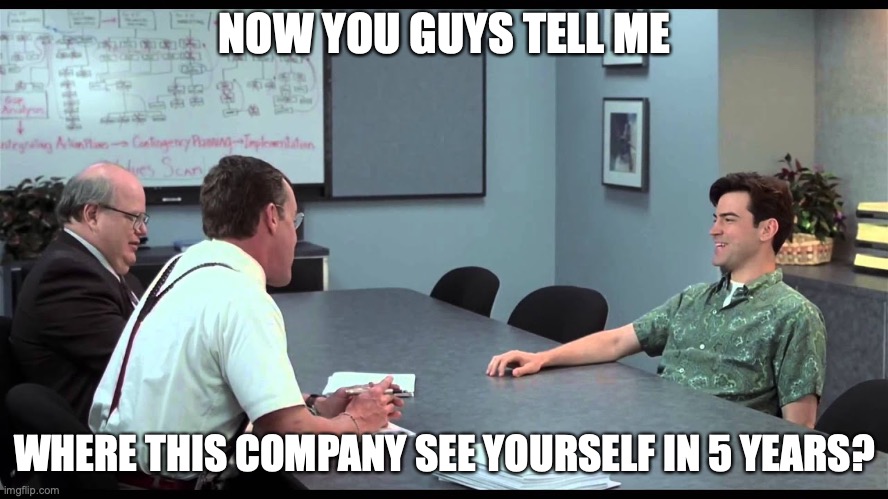The busiest time of the year is upon us, and I don’t mean the Christmas madness at all. Rather, it’s the “career summaries and plans” that often accompany the end of the year. Today I have some advice for you on how to talk to your future employer, a brief of the gigantic scandal at Sii’s Polish branch and a short analysis of layoffs at Meta. The coincidence of topics is incidental. Seriously.
Reverse interview – questions for the future employer
Let’s say your final year summary prompted you to write back to recruiters. This time, don’t fold under the pressure of the questions. Just ask them yourself!
Reverse interviewing, which is the strategy of asking the right questions when interviewing a potential employer, will help you do this. Literally, it’s about swapping places with recruiters for a moment. On GitHub you’ll find a powerful repository of questions that allow you to get to know the company better, and sometimes… cause considerable embarrassment on the other side of the negotiating table. If the embarrassment is excessive, you’d better run away.

The questions are divided into several categories, such as position, team, technology, potential cooperations, but also social issues or company. In each of these, you will find a dozen different questions to help you detect red flags. In my humble opinion, the team questions deserve special attention – it’s useful to know who we will be working with and on what terms. What happens if you reject a predetermined deadline? What meetings take place during the week? How are expectations and goals set? Who sets them? Who do the developers learn from?
Don’t be afraid to bring up such topics during recruitment. No employer should find you ‘intrusive’ but rather ‘knowing’!
Source:

The landscape after the Sii’s scandal in Poland
It has been a long time since there has been such a drama in Poland. We are, of course, talking about the conflict between Mr Grégoire Nitot, the CEO of Sii, and Mr Krystian Kosowski, an employee who tried to start a trade union at the company. After a few days, Mr Grégoire wrote him a very emotional and not very elegant message, and Mr Krystian was fired for ‘acting against Sii’.
The message sent by the CEO went viral on the internet. It is not short of harsh phrases such as: “Your behaviour is unacceptable & disgusting”, “It is a shame for Lodz region & CC ITO to have recruited a person like you” and even “I hope you will quit Sii very soon”. The problem is that the ability to form trade unions is guaranteed by the Polish constitution, and the ability to unionise is one of Sii’s values.

Just when it seemed that from the perspective of brand image things could not get any worse, Sii published another statement from the CEO. According to Mr Grégoire, “It happens that trade unions are sometimes led by extremists whose actions are directed against companies, as at Sii”. The CEO also recommends reading online forums where you can know more about Mr Krystian and his adventures in previous companies.
Really, I wouldn’t want to take sides here (especially as I don’t know all the details). The case is generating gigantic emotions, with both Mr Grégoire and Mr Krystian being attacked in the comments. The former for his dismissive attitude towards the law and the employee, and the latter for his ‘claimant’ approach and hating Sii.
Nevertheless, I’m amazed by Sii’s response as a brand. In terms of Public Relations and Employer Branding, absolutely nothing worked here. There was no quick response to the emerging crisis, no drive to de-escalate or professional comments to the media, which were more and more willing to cover the topic. Instead, Mr Grégoire publicly declared war on Mr Krystian and indulged in the besieged fortress syndrome – to the delight of the public.

The result? Every Sii post on Facebook is now commented on by dozens of people, even hundreds of people, who appeal to employment law and common ‘decency’. Negative opinions about Sii appear everywhere – on Google, social media, and job portals.
Something tells me this is going to be a long crisis. And painful in its consequences.
Sources
- https://www.bankier.pl/wiadomosc/Sii-Polska-Pracownik-zwolniony-dyscyplinarnie-za-zalozenie-zwiazku-zawodowego-8447680.html
- https://www.facebook.com/zwiazkowaalternatywa/posts/572469528219265
- https://www.facebook.com/Sii.Polska/photos/a.134596529976367/4859488130820493/
- https://www.reddit.com/r/antiwork/comments/z7cc4h/email_from_the_ceo_to_an_employee_who_founded_a/

A brief analysis of layoffs at Meta
For the past few months we have been bombarded with information about big layoffs at the tech giants, but you have to admit that the figures reported by the media have been quite ‘anonymous’. Until now. Last week a colleague from Team Vived shared a link to an analysis that Cameron Porteous had made. It was based on a form completed by 2,000 redundant Met employees. This made for a solid research group, from which some interesting conclusions were drawn and information hidden by Zuckerberg’s company became a little more public.
It appears that the Recruiting and Engineering departments were hit hardest by the redundancies (around 50% of surveyed). While Engineering teams were depleted by juniors, Recruiting lost mostly very experienced employees. Further down the line, people in the Product and Marketing departments were made redundant. To my surprise (again), the contracts were cut with the most experienced people – mainly those who had been operating in their specialisation for more than 10 years!
And here are the charts:
In the case of the US market, the visas held by employees are also important. As many as 46% of laid-off engineers admitted to needing support in obtaining a new visa after losing their job, but the same need was reported by only 8% of recruiters (despite being the largest laid-off group).
Even if it is ‘just a survey’, which is subject to some statistical error, it definitely shows the effect caused by the hiring freeze in the United States. The seniority of those being laid off is also strongly surprising. It seems that even the most experienced people cannot be sure of their position.

Fortunately, there is still no shortage of alternatives in job opportunities, so… read, develop, and have a plan B!




